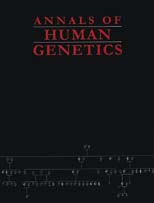Crossref Citations
This article has been cited by the following publications. This list is generated based on data provided by
Crossref.
Wang, Kai
Huang, Jian
Logue, Mark
and
Vieland, Veronica
2001.
Combined Multipoint Analysis of Multiple Asthma Data Sets Based on the Posterior Probability of Linkage.
Genetic Epidemiology,
Vol. 21,
Issue. S1,
Bartlett, Christopher W.
Flax, Judy F.
Logue, Mark W.
Vieland, Veronica J.
Bassett, Anne S.
Tallal, Paula
and
Brzustowicz, Linda M.
2002.
A Major Susceptibility Locus for Specific Language Impairment Is Located on 13q21.
The American Journal of Human Genetics,
Vol. 71,
Issue. 1,
p.
45.
Sebastiani, P.
Yu, Y.-H.
and
Ramoni, M.F.
2003.
Bayesian Machine Learning and Its Potential Applications to the Genomic Study of Oral Oncology.
Advances in Dental Research,
Vol. 17,
Issue. 1,
p.
104.
Logue, Mark W.
Vieland, Veronica J.
Goedken, Rhinda J.
and
Crowe, Raymond R.
2003.
Bayesian analysis of a previously published genome screen for panic disorder reveals new and compelling evidence for linkage to chromosome 7.
American Journal of Medical Genetics Part B: Neuropsychiatric Genetics,
Vol. 121B,
Issue. 1,
p.
95.
Ginsburg, Emil
Malkin, Ida
and
Elston, Robert C.
2004.
Sampling correction in linkage analysis.
Genetic Epidemiology,
Vol. 27,
Issue. 2,
p.
87.
Logue, Mark W.
and
Vieland, Veronica J.
2004.
A New Method for Computing the Multipoint Posterior Probability of Linkage.
Human Heredity,
Vol. 57,
Issue. 2,
p.
90.
Bartlett, Christopher W.
Flax, Judy F.
Logue, Mark W.
Smith, Brett J.
Vieland, Veronica J.
Tallal, Paula
and
Brzustowicz, Linda M.
2004.
Examination of Potential Overlap in Autism and Language Loci on Chromosomes 2, 7, and 13 in Two Independent Samples Ascertained for Specific Language Impairment.
Human Heredity,
Vol. 57,
Issue. 1,
p.
10.
Wassink, Thomas H
Brzustowicz, Linda M
Bartlett, Christopher W
and
Szatmari, Peter
2004.
The search for autism disease genes.
Mental Retardation and Developmental Disabilities Research Reviews,
Vol. 10,
Issue. 4,
p.
272.
Logue, Mark W
George, Andrew W
Spence, M Anne
and
Vieland, Veronica J
2005.
Performance comparison of two-point linkage methods using microsatellite markers flanking known disease locations.
BMC Genetics,
Vol. 6,
Issue. S1,
Wiltshire, Steven
Morris, Andrew P.
McCarthy, Mark I.
and
Cardon, Lon R.
2005.
How useful is the fine-scale mapping of complex trait linkage peaks? Evaluating the impact of additional microsatellite genotyping on the posterior probability of linkage.
Genetic Epidemiology,
Vol. 28,
Issue. 1,
p.
1.
Bartlett, Christopher W.
and
Vieland, Veronica J.
2007.
Accumulating quantitative trait linkage evidence across multiple datasets using the posterior probability of linkage.
Genetic Epidemiology,
Vol. 31,
Issue. 2,
p.
91.
Wassink, Thomas H.
Vieland, Veronica J.
Sheffield, Val C.
Bartlett, Christopher W.
Goedken, Rhinda
Childress, Deborah
and
Piven, Joseph
2008.
Posterior probability of linkage analysis of autism dataset identifies linkage to chromosome 16.
Psychiatric Genetics,
Vol. 18,
Issue. 2,
p.
85.
Huang, Yungui
and
Vieland, Veronica J.
2010.
Association statistics under the PPL framework.
Genetic Epidemiology,
Vol. 34,
Issue. 8,
p.
835.




